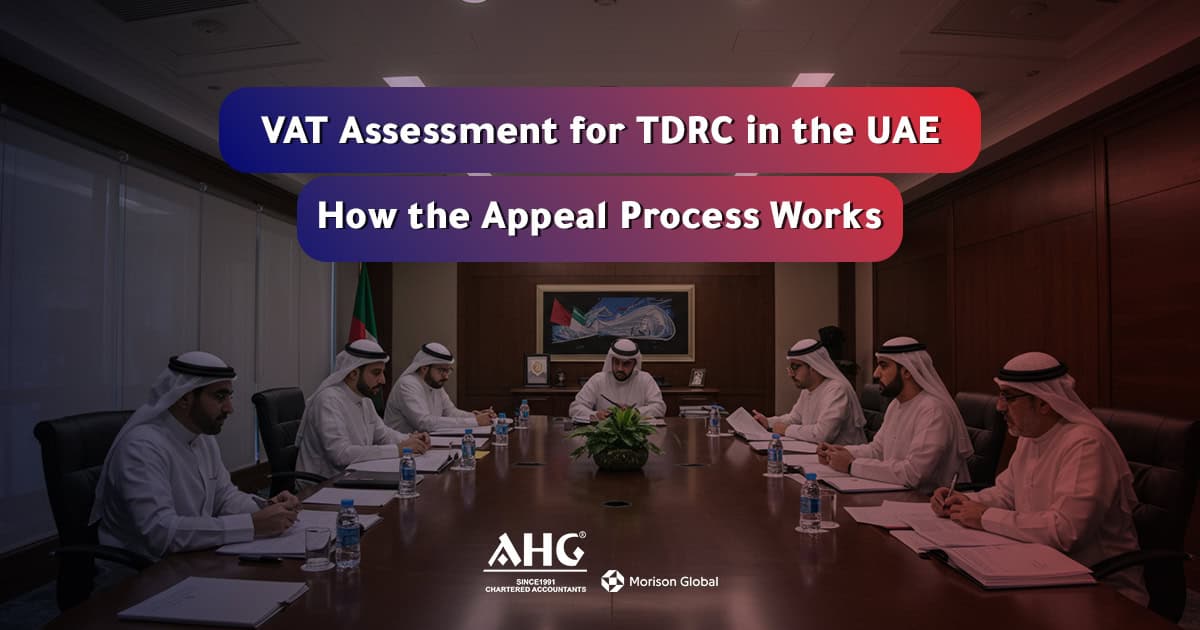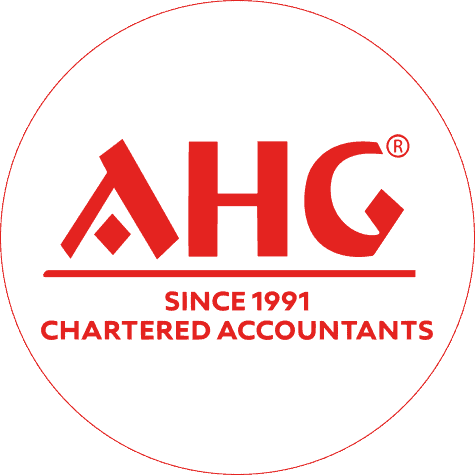VAT Assessment for TDRC
Government departments and businesses in the UAE sometimes struggle with VAT decisions from the Federal Tax Authority, especially when they feel the ruling is unfair or not accurate. Many want to challenge these outcomes, but the steps for objections and appeals are not always easy to follow.

With Cabinet Decision No. 12 of 2025, the UAE has set up a clearer and more organized process to handle VAT objections and appeals through the Tax Disputes Resolution Committee. AHG explains the key details in a straightforward way to help you better understand VAT Assessment for TDRC. This updated framework gives taxpayers more confidence and direction when managing VAT Assessment for TDRC.
What is VAT Assessment for TDRC
The Tax Disputes Resolution Committee is an independent body designed to settle tax disagreements between taxpayers and the Federal Tax Authority. It is made up of one judge and two qualified tax professionals registered with the UAE Ministry of Justice. The committee reviews objections carefully and makes its decision based on facts and tax laws.

Taxpayers can approach the TDRC either on their own or with the guidance of a VAT agent in the UAE. This process plays a key role in providing clarity and fairness for VAT Assessment for TDRC, ensuring businesses have a structured way to resolve disputes. By following the right steps, taxpayers can benefit from the protections offered under VAT Assessment for TDRC.
Who Can Apply for VAT Assessment for TDRC
Businesses or individuals who could not resolve their tax disputes through the FTA’s reconsideration process have the right to take their case to the Tax Disputes Resolution Committee. This is the next step when the initial option does not work. Government entities acting under their sovereign powers also have a clear procedure for filing VAT objections or appeals. However, this applies only to the authorities listed under Cabinet Decision No. 58 of 2017, which includes federal and local departments but not the FTA itself.
For entities involved in day-to-day commercial activities, the regular process must still be followed. This structured approach ensures fairness and transparency in VAT Assessment for TDRC, offering both private and government entities a proper channel for resolving tax issues. With VAT Assessment for TDRC in place, taxpayers can rely on a formal system that protects their rights and promotes compliance.
When Can a Government Entity File for VAT Reconsideration in the UAE
A government entity has the right to object to a tax authority decision through the TDRC, but timing is crucial. The rules are:
- The objection must be filed within 40 working days from the date the decision is received.
- The objection will be turned down if a VAT Reconsideration request was not submitted first.
- The objection will also be rejected if it is filed after the deadline.
One key difference from private businesses is that government entities are not required to pay the disputed VAT or penalties before submitting their objection. With proper guidance, VAT Reconsideration in the UAE gives government bodies a structured way to challenge decisions while protecting their rights. For smooth handling of the process, working with AHG and their expert VAT agents can be very helpful.
What Follows After Filing an Objection
When an objection is submitted to the TDRC, the committee is expected to respond within 20 working days. If no decision is released within this period, the case is treated as rejected. For disputes where the total VAT and penalties do not exceed AED 100,000, the TDRC’s word is final. This process highlights the importance of timely steps and professional guidance.
Many businesses and government bodies seek support from experts like AHG to avoid setbacks and ensure they handle VAT Reconsideration in the UAE smoothly. Understanding these procedures is key to resolving disagreements effectively, especially when it comes to VAT Reconsideration in the UAE.
How Government Entities Can Appeal Further
If a government entity is not satisfied with the TDRC’s decision, it has the right to take the matter to the federal courts. The process comes with a few important conditions:
- The appeal must be submitted within 40 working days of receiving the TDRC’s decision.
- The disputed VAT amount has to be paid before filing the case in court.
- Administrative penalties only need to be settled after the court issues its final ruling.
This process helps reduce the immediate financial pressure at the start of a dispute. With the right support from specialists like AHG, entities can handle these steps more smoothly. Knowing the rules and timelines is crucial, especially when dealing with VAT Reconsideration in the UAE. Having experts by your side ensures you are on the right track and prepared for the challenges of VAT Reconsideration in the UAE.
Key Rules for Notifications
When filing with the TDRC, government entities are expected to keep the right authorities in the loop. The rules are simple:
- Federal entities must inform the Ministry of Finance within one week of submitting their case.
- Local entities must notify their Emirate’s finance department within the same timeframe.
Even if an entity misses this step, it does not block them from moving forward with the objection. Clear communication is always recommended to avoid unnecessary complications, especially when dealing with VAT Reconsideration in the UAE. By following these rules and working with experts such as AHG, entities can handle the process with confidence and ensure smoother VAT Reconsideration in the UAE.
Main Differences Between Private Businesses and Government Bodies
The way government entities handle tax disputes is not the same as private companies. Here’s how the process usually plays out:
- Before raising an objection, private companies must pay both VAT and penalties, while government bodies can move forward without making any payment.
- When appealing to court, private businesses must either pay half of the penalties or provide a bank guarantee, but government entities only need to pay the VAT amount.
- For penalties, private companies are required to pay them before appealing, while government entities can wait until the court gives its final decision.
This setup gives public departments more breathing space and eases the financial load at the start of a dispute. It also ensures that VAT Reconsideration in the UAE is handled in a fair way that takes into account the unique position of government entities. For businesses, the process is stricter, but both sides benefit from clarity in handling disagreements. If you are still unsure how VAT Reconsideration in the UAE works, consulting experts like AHG can help make the path clearer.
Guidelines for Regular Taxpayers
When it comes to private businesses and individual taxpayers, the TDRC process follows a stricter path. To make sure everything runs smoothly, these rules apply:
- Objections must be filed within 40 working days from the date of the FTA decision.
- Any penalties under dispute need to be paid before filing the objection.
- A reconsideration request should first be submitted to the FTA before turning to the TDRC.
- Taxpayers must apply to the correct TDRC based on where they are registered:
- TDRC Dubai for those based in Dubai.
- TDRC Abu Dhabi for Abu Dhabi residents and non-residents.
- TDRC Sharjah for Sharjah and the remaining Emirates.
- The TDRC is required to give a decision within 20 working days.
Handling VAT Reconsideration in the UAE can feel complicated for regular taxpayers, especially with these requirements in place. That is why involving experts such as AHG or a VAT agent in Dubai can save time and prevent costly mistakes. VAT Reconsideration in the UAE is not just about filing on time, but also about following the right steps with proper guidance.
How can AHG support you
At AHG, our VAT specialists in the UAE handle the entire process of preparing and submitting applications to the TDRC. We take care of all communication with the authorities, ensuring your case runs smoothly from start to finish. Since VAT Reconsideration in the UAE involves strict compliance, our team makes sure every step aligns with the legal framework.
We carefully review all relevant documents and evidence to build a strong case in your favor. Our experienced tax advisors are well-equipped to analyze each situation, provide practical guidance, and recommend strategies to reach the best possible outcome. With AHG by your side, you can navigate VAT Reconsideration in the UAE with confidence and clarity.
Managing finances as an influencer in the UAE can get complicated, but AHG makes it easier. With our experience in influencer accounting, we handle everything from tax compliance to financial planning, so If you need any tax services or tax consultancy, you won’t find better than AHG Legal Accounts. Each of our teams has extensive experience in this field and will provide you with the best services in a professional manner. Please feel free to contact us today, we are always waiting for your request to be fulfilled!
Click Here


